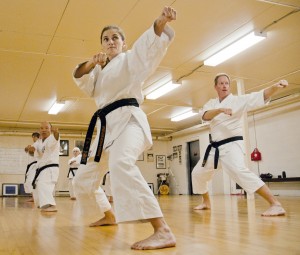By: Alicia Wynter

BELLEVILLE, Ont. (08/11/2011) From left, Cheryl Moggridge, Bonnie Gryce, Betty Brant, and Jan King motion through warm-up exercises with their teacher Kenzo Dozono in Belleville at the S.K.I. Belleville Karate School. Photo by Alicia Wynter
Kenzo Dozono uses a philosophy of understanding and relating when teaching his students the art of karate.
Dozono has been teaching students of all ages and levels at the S.K.I. Belleville Karate School in Belleville since 1969.
“I never had a bad day at all, because when I teach class, kids give me such energy, and I’m 67, but I behave like a four or five year old kid,” says Dozono.
He believes that when he teaches his students he must be able to teach students of all ages, and from them, he also gains knowledge and experience and is always learning something new from his students every day.
“Then you know, to do so, you have to have experience to associate with them, and not forgetting when you were a little kid, and when you are a teenager, and they are pissed off at something, then you can understand, you can say, ‘You know, I was there.’ I learned something, so I give you what to do, then teenagers can talk with me, and they understand that I was there too. They have a common bond, a conversation. That’s my job,” Dozono says.
Today Dozono is now one of the highest-ranking black belt masters and also the 2002 & 2003 All-Japan Karate Championship Master’s Division Kata Champion.
Dozono always remembers that he has to relate to his students to get his lessons across for them to understand.
“Karate is one tool for me to associate with other people. It’s not my purpose to teach karate. I want to be a life artist, not a karate artist,” says Dozono.
He enjoys everyday with excitement and wants other people to enjoy their life as much as he does because he has had a fantastic life and also hopes because of him, they will have “a wildness” in their personality, and have more curiosity for their life.
Dozono was introduced to karate at the age of three through his father’s friend who happened to be a karate master in South Japan because he was sick and was not able to walk. Dozono started off by cleaning the floors of the karate gym by hand, and using his legs and feet to push the rag along the floor, he regained strength in his legs and arms, and that was his first year of karate training. At first, he hated school and physical education. He was short and weak and didn’t like racing because he could not keep up with the other children.
“Then I started wondering, ‘how can I do, you know, become first place finisher to get better prize instead of only participation prize?’ ”
Dozono found a way to motivate himself, and become better by running every morning and night for one year. After a while he realized that he was good at long distance running and began winning long distance championships.
“Then I got more confidence, I realized that I could do more. Then I started to concentrate for karate training, that’s the beginning.”
Dozono took off after he became a first-degree black belt when he was 14-years-old.
When asked about his future with karate and martial arts, he says the question is a very difficult one to answer. His reason was because each generation was different from the past generations, and the future generation will be different from todays, so he is not able to give a clear answer about the future of karate.
“But karate is a martial art, so even other arts change, but karate will be appreciated in a long, long time. Traditional karate will never change. It’s like, classic music, even classic music, even though generation’s change, people will appreciate. So karate is a classic martial art, so we call it traditional martial art.”
Dozono has confidence in himself as an instructor to teach traditional karate in the highest of standards to his students so that the next generation will carry on traditional karate to the next generation.
“So, it’s up to the instructors. It’s not up to the students. Students trust teachers, right? So, if we have good instructors, then martial arts will survive. But if we have bad instructors, then martial arts will be destroyed, because like classic music, Beethoven, Bach, you know their music never changes, even hundred years later, right?”
Dozono says it is his responsibility to teach the highest standard. It doesn’t matter how many students he has but he hopes children will become leaders for the next generation after he is gone.
Betty Brant, one of Dozono’s students had been training for karate for 25 years, and all of those years, she has been training with Dozono, and plans on completing her training at his dojo. Brant has always been into a lot of sports, but enjoys martial arts the most because of the training, fitness, discipline, dedication, and also because it improves skills.
There are 10 levels of black belt degrees – Dozono is an eighth degree black belt, or hachidan, which means eighth degree black belt in Japanese.
Brant is now a fourth degree black belt, a yodan, which means forth rank or grade, and forth degree black belt in the martial arts ranking systems. Both Brant and her 13-year-old daughter, Megan Brant, now train at the S.K.I. Belleville Karate School.